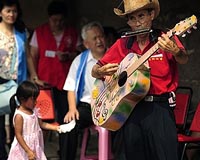| . |  |
. |
Taipei (AFP) Aug 19, 2009 Warming relations between Beijing and Taipei have made it easier for the US and other countries to offer aid to typhoon-hit Taiwan, but the shadow cast by China remains highly sensitive, analysts said. When news broke this week that US military helicopters were coming to reinforce rescue efforts after Typhoon Morakot, it offered a rare ray of hope amid images of flattened villages and angry protesters. Taiwan's cable news channels played Hollywood film clips and cartoon-like computer graphics of helicopters leaving the deck of the USS Denver and landing on a map of the diplomatically-isolated island. Meanwhile, another aid offer was quietly rejected: helicopters from China. The contrast captured Taiwan's complicated situation, according to Liu Bih-rong, a political scientist at Taipei's Soochow University, "The disaster highlights the delicate triangle relationship between Taiwan, China and the United States," Liu told AFP. "If this happened anywhere else in the world, this kind of aid from the US and China would not be so complicated." The arrival of the US helicopters represented the first joint Taiwan-US military operation since 1979, when Washington switched its diplomatic recognition from Taipei to Beijing while remaining Taiwan's main arms supplier. President Ma Ying-jeou's government tried to play down the political aspects of the aid mission, but experts said the typhoon provided a reminder of Taiwan's unique situation in the world and how that situation was changing. On Wednesday, the heavy lift helicopters were carrying excavation equipment into remote areas, speeding up repairs on shattered roads and bridges. At the same time, China delivered by sea the first 100 prefabricated houses from a pledge of 1,000 -- an offer Taiwan accepted. "Despite improving cross-Strait relations, the two sides are still technically at war," Liu said. "China's helicopter offer is a difficult problem. If the government accepted, it might have a political snowball effect," he added. An unnamed government official was quoted as telling Taipei's United Daily News that there were fears that Chinese military helicopters could collect images of sensitive facilities that are invisible to satellites. "There is a high risk Taiwan would be left naked," the official said. Beijing still regards the island as part of its territory awaiting reunification, if necessary by force. "We consider this assistance to be humanitarian and we don't politicise the assistance," Ma told a new conference on Tuesday, denying China was a factor in accepting aid from anyone. But the same contributions would have been unlikely a decade ago. When Taiwan suffered the deadliest natural disaster in its history in September 1999, a 7.6-magnitude quake that claimed around 2,400 lives, Taiwan accused China of delaying a UN rescue mission. It also said China deliberately held up a Russian mission by not letting it fly over Chinese airspace. The American Red Cross said it needed Beijing's approval before sending aid for the earthquake. This week, however, US State Department Assistant Secretary Philip J. Crowley suggested no such consultations occurred after Morakot. "I don't believe that we felt it was necessary to inform China in advance," he told reporters in Washington. But some observers were skeptical. "My assumption is that either Taipei or Washington must have communicated with Beijing in advance," said Emile Sheng, an expert in China-Taiwan ties. "This would have been impossible two years ago when cross-Strait relations hit their lowest levels," he said, referring to the confrontations triggered by the provocative pro-independence stance of Ma's predecessor Chen Shui-bian. Diplomatic back channels or not, the tone has improved since Ma was elected last year. Taiwanese people donated 176 million US dollars to help victims of last year's earthquake in central China, Ma said, adding that China was now repaying that kindness with money, shelters, sleeping bags and other aid. "In terms of relief, the two sides have something in common: We care about each other," he said. Share This Article With Planet Earth
Related Links Bringing Order To A World Of Disasters A world of storm and tempest When the Earth Quakes
 Taiwan aborigines fear typhoon will tear them from land
Taiwan aborigines fear typhoon will tear them from landChishan, Taiwan (AFP) Aug 18, 2009 Danhu Pasavi's Bunun tribe has lived in the mountains here in southern Taiwan for more than three centuries, but now he fears Typhoon Morakot could tear them from the land of their ancestors. Like most of the typhoon's victims, he is a member of Taiwan's indigenous tribes who lived here for thousands of years before the Han Chinese came in the 17th century -- and whose spiritual attachment ... read more |
|
| The content herein, unless otherwise known to be public domain, are Copyright 1995-2009 - SpaceDaily. AFP and UPI Wire Stories are copyright Agence France-Presse and United Press International. ESA Portal Reports are copyright European Space Agency. All NASA sourced material is public domain. Additional copyrights may apply in whole or part to other bona fide parties. Advertising does not imply endorsement,agreement or approval of any opinions, statements or information provided by SpaceDaily on any Web page published or hosted by SpaceDaily. Privacy Statement |